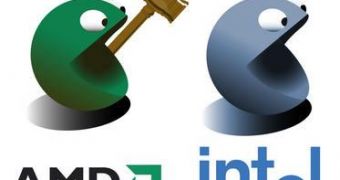Although things have finally started to move for number two chip manufacturer, the situation is still far from what AMD would have wished. When the Arabian company Mubadala announced that they have purchased Advanced Micro Devices shares that were worth $622 million, things have started falling apart on the stock market. The company's stock has dropped almost $2 a share, which would translate in 20 percent loss. Of course, this might not be the result of silicon technology mixed with oil extraction, but it casts AMD into a deeper state of coma, given the fact that they are facing a pretty huge minus of over $5 billion.
In a recent interview, AMD's Head and CEO, Hector Ruiz, affirmed that the current stock price in AMD's shares has dropped because of an "extremely pessimistic" state of the technology market, that is due to end in two quarters at most. "But I think things will have to settle down. That may take one or two quarters to occur," Ruiz added. AMD has suffered market recessions since January 2006 and, during that time, the company has lost about 75 per cent of their value, from $42 to $10 a share - the current price.
Stock analysts say that AMD's drop is caused by the ruthless competition with rival Intel, as well as the company's precarious state of finances that occurred immediately after the ATI acquisition. Ruiz considers that Abu Dhabi's investment comes at the right time and would help AMD continue funding the research and development operations, the strongest point of the chipmaker. "If you look at the last five years, if you look at what major innovations have occurred in computing technology, every single one of them came from AMD. Not a single innovation came from Intel," continues Hector Ruiz.
The series of problems AMD is facing is completed by Intel's attempt at squeezing the competition out of the market by using their market share and production capabilities. "Intel continues... to abuse their monopoly and that's why around the world governments and regulatory agencies continue to go after them," claims CEO Ruiz. AMD is not the only to complain that Intel adopts unfair measures, as Intel has been accused of anti-competitive practices by both the European Union and the South Korea, but US's Federal Trade Commission said that they would stay away and wouldn't charge Intel with anti-competitive practices.

 14 DAY TRIAL //
14 DAY TRIAL //